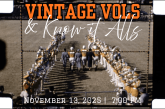My time speaking with a horror novelist
 The weather is finally becoming cooler. The stores are decked in orange and black. And the pumpkin spice is everywhere. It must be October. Although the spice of pumpkin flows from within every store and becomes an ingredient in what seems like every single product on the market, October is also known for that grown-up excuse to dress up and act like a kid. Halloween is almost upon us and with that it brings its fair share of horror. No doubt Netflix and Hulu will be brimming with horror movies. While watching horror movies can be fun there are some that would hope to bring you that psychological thrill all year round. For one man in particular, he wishes to bring you stories that he pulled from within the darkest recesses of his mind. For Jeffery X Martin, he’d like to keep you on the edge of your seat and jumping at the moving shadows for more than just 31 days each October.
The weather is finally becoming cooler. The stores are decked in orange and black. And the pumpkin spice is everywhere. It must be October. Although the spice of pumpkin flows from within every store and becomes an ingredient in what seems like every single product on the market, October is also known for that grown-up excuse to dress up and act like a kid. Halloween is almost upon us and with that it brings its fair share of horror. No doubt Netflix and Hulu will be brimming with horror movies. While watching horror movies can be fun there are some that would hope to bring you that psychological thrill all year round. For one man in particular, he wishes to bring you stories that he pulled from within the darkest recesses of his mind. For Jeffery X Martin, he’d like to keep you on the edge of your seat and jumping at the moving shadows for more than just 31 days each October.
I’d like to say that we met in some dark coffee shop with ambient gothic music playing in the background, the smell of clove cigarettes filling the air but this is 2016; we arranged all this on Facebook Messenger. Hey, we’re both grownups with tons of responsibilities. Still, we didn’t let that stop us from participating in an interview that would inform people of who Jeffery is, what it is he does, and other small tidbits of information. Jeffery likes to write stories. These stories tend to be horror based. Jeffery has written a bunch of stories and has had many of them published.
B: Since you write horror, you must not like nice things. Why don’t you like nice things?
X: See, now that’s one of the weirdest preconceived notions out there. Horror writers must be total weirdos when they aren’t at work. I like nice things. I have nice things. My wife is pretty and smart. My children are grown and paying taxes. We don’t live under a bridge, waiting for the normies to walk by so we can hamstring them and bite their eyes out. It’s not a terrible idea, but it’s not what we do. Horror writers and horror fans in general are like everyone else. Just a little weirder.
B: What role does music play in your writing?
X: It’s pervasive. I go on jags where the energy of the music seems to match the pacing and structure of what I’m working on. I wrote Hunting Witches listening to nothing but live Iron Maiden. That’s kind of a slow-burn story, so it makes sense that I was listening to eleven-minute-long metal epics based on classical poetry. I also tend to use song titles as story or chapter titles. There are a lot of musical references in my work. Throwing that kind of stuff in for attentive readers is fun for me.
B: Have you considered writing outside your genre?
X: It all ties in. Every genre has a horror element to it. I would classify what I’m working on now as a love story. It’s probably not. There’s a lot of blood in it. But why can’t a love story be horrifying? Think about “Overboard,” that old movie with Kurt Russell and Goldie Hawn. Is that a sweet, wacky fish-out-of-water story, or a horrific tale of a backwoods father who kidnaps and gaslights a woman into being the matriarch for his redneck family? Doesn’t that make her Leatherface?
Huh. So, no I haven’t considered writing in another genre because it all twists around in my brain into something horrible.
B: What’s the best way to help an independent author, like yourself?
X: Buy the books. Read the books. Tell your friends to buy and read the books. We rely on word of mouth more than Craigslist hookers. The most important thing is to leave reviews on Amazon. Even if they are crappy one-star reviews, we need them. Reviews make Amazon notice authors. We’re all down here at the base of the Amazon altar, waving our stories around, trying to get someone’s attention. Reviews are like flares in the dark night. It only takes a few minutes, but leaving a review for a boo you read is the single best thing you can do for a writer you love.
B: Who are your literary influences?
X: Kurt Vonnegut taught me that every story can have a message without being ham-fisted. There’s also a great economy to his work that appeals to me. Short, simple sentences that almost trick the reader into reading. Hunter S Thompson taught me the importance of trying to master the language. He was the king of adjectives, brutal descriptions that stick in the brain like a poisoned dart. Sure, profanity is great for a quick shocker, but building a well-constructed sentence with precise wording and apocalyptic imagery is better.
B: What is your opinion on the current state of modern horror?
X: Fiction is where it is at right now. Indie authors are ruling right now, releasing the kind of original horror that fans have been screaming for. Look for small presses like Shadow Work Publishing, who are really pushing the limits of what American horror can do. Overseas, as well, where guys like Matt Shaw are gleefully releasing extreme horror and psychological horror that will literally give you nightmares. It’s the same with horror film. The best horror flicks are playing the festival circuit for two years before winding up on Netflix or another streaming service. Big-budget horror hasn’t worked for decades. You can’t deal with the issues horror needs to handle while taking money from a giant studio conglomerate. That’s why we get so many remakes. They’re safe. They’re proven. They’ve got built-in brand recognition. And nine times out of ten, they’re shit.
B: When did you first find yourself attracted to horror movies/stories?
X: When I was nine years old and saw Jamie Lee Curtis in John Carpenter’s Halloween. First celebrity crush? You bet. But I had been reading Stephen Kind and Michael McDowell before that even happened. My grandmother’s house was across the street from the library, so when I was a kid, I spent a lot of time reading. I found these anthologies with Alfred Hitchcock’s name on them. I knew who he was, so I figured if he endorsed it, it was worth reading. And they were all these great Golden Age authors. Matheson, Bloch, Sturgeon, Lieber. It was a crash course for young horror fans. What the hell was I gonna read? Laura Ingalls Wilder books?
Actually, I did read all those. They were scary in a totally different, Oregon Trail kind of way.
Besides writing horror novels, what other types of media have you been involved with concerning this genre?
I’ve done some work with Jim Branscome. We’ve written a couple of screenplays together and I worked on his web-series, Pumpkin Morgue Paranormal Investigators. I’m also working on a scripted horror podcast with Lost After Dark writer Bo Ransdell. I also co-host the Cinema Beef Podcast with Gary Hill and Jamie Sammons, and I’m on the panel for the Theme Warriors podcast, with Mike Maryman, Doug Tilley and Iris Saravia. You can also listen to me as the host of Screen Kings, where authors Duncan Ralston and Thomas Flowers and I discuss the screen adaptations of Stephen King stories. And there are old episodes of Kiss the Goat to listen to, which is the podcast about Devil movies I co-host with my wife, Hannah. There are many opportunities to get sick of my own voice.
B: Advice for aspiring novelists?
X: Don’t do it. Writing novels is a horrifying, difficult endeavor which should never be taken lightly. But if you’re bound and determined to put yourself through the wringer, then I say this. Write. Just write. Do not edit while you’re writing. Just get the story out of your head and onto whatever medium you’re using. Think of it as vomiting. Nobody stops while puking and things, “Wow, I wish I could have done that last heave differently.” Get it out, fix it later.
B: Can you walk the reader through the usual steps you take to turn an idea into a short story or a novel?
X: I use what I call the Hellraiser Method. You’ve seen Hellraiser, right? It’s about a guy who comes up out of hell as a skeleton, but the more blood he receives, the more of a human form he takes. When he first shows up, he’s just sort of chunks. Legs. Arms. A torso. A head. Big, unformed, barely recognizable hunks of malleable flesh. Those hunks represent the big plot points of your story. Go ahead. Write them out. Add in as much detail as you can. Once you’ve got those down, the work is to create the connective tissue. Hook your big points together with story sinews and muscle. Think of Uncle Frank up in that humid attic, waiting for pieces of flesh to grow on his body, everything slowly coming together. By the time it all becomes a cohesive unit, you’ve got a novel. It may not be a good one, but it’s yours.
B: Have you produced any other form of literature besides horror?
X: My first book is called Tarotsphere, and it’s a funny book. I took all the standard Tarot cards (the Rider-Waite deck) and gave all the images their own stories. The design is a little wonky. I’d like to get back in there and fix it up. It’s worth a look. But that’s pretty much it. Everything else has been a scary story. Hopefully, anyway.
If you are a horror fan and would like to support a local, independent, award-winning author you can find Jeffery’s books on Amazon at his author page: amazon.com/author/jefferyxmartin.
His newest novel is currently included in a five book bundle called Selected Horrors by Shadow Work Publishing.







